Browsing News Entries
FOCUS expands reach into parishes, hoping to revitalize local Church
Posted on 01/3/2026 13:00 PM (CNA Daily News - US)
 Left to right: Curtis Martin, founder of FOCUS, and his son, Brock Martin, vice president of parish outreach at FOCUS, sit down for an interview with CNA on Dec. 10, 2025. | Credit: Francesca Fenton/EWTN News
Left to right: Curtis Martin, founder of FOCUS, and his son, Brock Martin, vice president of parish outreach at FOCUS, sit down for an interview with CNA on Dec. 10, 2025. | Credit: Francesca Fenton/EWTN News
Jan 3, 2026 / 08:00 am (CNA).
For nearly 30 years, FOCUS has been known for its missionary work on college campuses. Earlier this year, the ministry began to expand its reach with a new branch — FOCUS Parish.
FOCUS Parish brings FOCUS missionaries into Catholic parishes to help revitalize the parish itself and the parishioners, and to form missionary disciples — laypeople who effectively spread the Gospel message in the local community and diocese.
Founder of FOCUS Curtis Martin and his son, Brock Martin, vice president of parish outreach at FOCUS, both agree that FOCUS Parish is a response to the need of sending missionaries to “where the people are.”
“If we’re trying to bring the Gospel to every man, woman, and child on the face of the earth, the vast majority of people don’t currently live on U.S. college campuses,” Brock told CNA in an interview. “The Catholic Church has amazingly already done this work — every inch of the globe is already mapped out into a parish structure. So, FOCUS’ move into parishes is really a response to the fact that we want to take this mission seriously. We need to send missionaries to where the people are.”
Curtis added: “Everybody lives in a parish, as Brock said, and evangelization takes root when there’s real transformation. It’s going to take place in families and in parishes. That’s where Catholics live. And so we want to be with them to share the Gospel of Jesus Christ with them in the midst, as Brock said, in the midst of friendship.”
Parishes who take part in FOCUS’ new ministry will receive two full-time missionaries who become part of the parish’s leadership team, help advise and lead parish ministries, and work to create small communities where the Gospel message is shared and spread to all parishioners.
“These missionaries are imbedding into the parish culture,” Brock said.
FOCUS Parish is currently in 25 parishes and plans to expand to an additional 25 parishes in 2026.
When speaking to the fact that FOCUS Parish has become the fastest-growing part of the apostolate, Brock credited the current “landscape of the parish in the United States.”
“Right now there’s about 16,000 parishes [in the U.S.],” Brock said. “I think the number of parishes who are waking up, the number of pastors who recognize that business as usual is not working, we have to, with new ardor and new methodologies, try to figure out how to live the new evangelization. I just think there’s a unique moment where as pastors and finance councils become aware of the opportunity, we’re seeing more and more people start to raise their hand at a faster rate.”
Curtis highlighted the retention rate of FOCUS Parish missionaries leading to the success of the ministry.
“We’re seeing greater longevity with our missionaries because they’re not walking with 18- to 22-year-olds, they’re walking with people who are of their same age, maybe older, maybe younger,” he explained. “The retention rate for FOCUS missionaries in Parish last year was 100%. Nobody left. By way of comparison, probably 25% of the missionaries left on campus; that’s part of our cycle. And so to be able to recognize, we can grow because of the longevity.”
With the growth to 25 more parishes in the new year, FOCUS is looking to hire an additional 50 to 55 missionaries — considering both moving campus missionaries to parishes and hiring individuals who have never been FOCUS missionaries.
As for his hopes for the future, Brock said: “My deepest hope in FOCUS Parish is that this would be a simple and repeatable gift that we can offer to the Church.”
Curtis said: “My hope for FOCUS in the parish is actually hope. I think a lot of leaders in the Church are good people but they’re discouraged and they’re kind of managing a slow decline. And that’s not the way Christianity works. Christianity has grown in every generation since the time of Christ. We’re living in a very abnormal time, at least in the West. It’s shrinking. That’s not the way it should be.”
He added: “There’s a resurgence of faith — articles are being written about this all over the world — FOCUS is just participating in a little way. Millions of people awakening to Christ. We need to welcome them and to be able to recognize the Church ought to be growing. This can work. And when you have hope you start to make decisions based upon that and all of a sudden you see the Church should be a place of growth.”
How a Catholic university is combating the health care crisis in Maryland
Posted on 01/3/2026 06:00 AM (CNA Daily News - US)
 Mount St. Mary’s University Physician Assistant Program Director Mary Jackson, MMS, PA-C, CAQ-EM, demonstrates hands-on ultrasound techniques with students at Mount St. Mary’s University in Emmitsburg, Maryland. | Credit: Photo courtesy of Mount St. Mary’s University
Mount St. Mary’s University Physician Assistant Program Director Mary Jackson, MMS, PA-C, CAQ-EM, demonstrates hands-on ultrasound techniques with students at Mount St. Mary’s University in Emmitsburg, Maryland. | Credit: Photo courtesy of Mount St. Mary’s University
CNA Staff, Jan 3, 2026 / 01:00 am (CNA).
In response to Maryland’s growing health care crisis, Mount St. Mary’s University is launching a physician assistant program later this month.
The private Catholic liberal arts university, located in Emmitsburg, Maryland, is partnering with the Daughters of Charity — the religious order founded by St. Elizabeth Ann Seton — to bring more students into the field of health care.
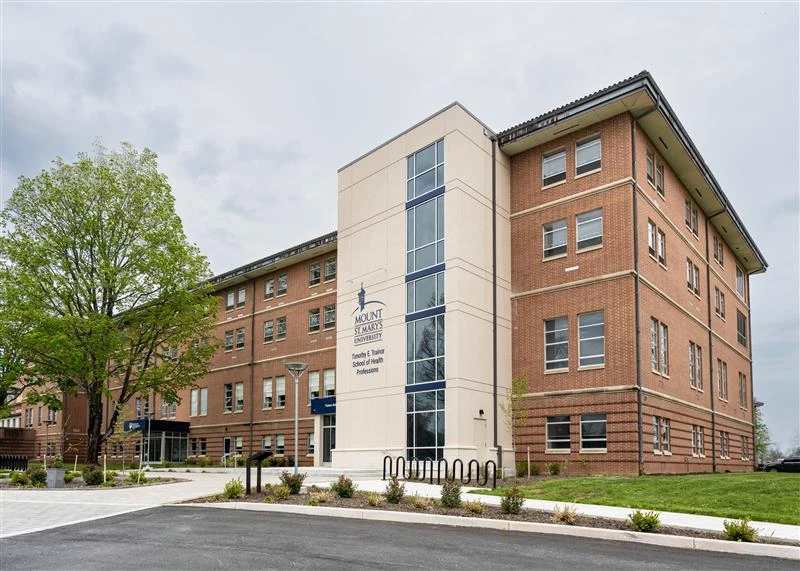
Amid a staffing shortage, Maryland has had the longest emergency room wait times in the nation for nine years, averaging more than four hours. The number of serious medical mistakes that have resulted in death or severe disability for patients has risen each year in Maryland for the past four years, according to a report published in September 2025.
A recent projection found that Maryland needs to increase the number of primary physicians by 23% by 2030 to cover the gap in primary care providers.
The Maryland Department of Health has cited staffing shortages — among several causes of rising medical errors — as something that Mount St. Mary’s program hopes to mitigate.

The program — part of the college’s recent move into the health care arena — will welcome its inaugural class of 43 students on Jan. 20.
The school’s new program includes resources for students to prevent burnout through its Center for Clinician Well-Being.
CNA spoke with physician assistant program director Mary Jackson about the new program.

CNA: What inspired the launch of the new physician assistant program?
Mary Jackson: The Mount made a very intentional decision to enter the health care education arena as another way to live out our mission. As a Catholic university, Mount St. Mary’s graduates ethical leaders who are inspired by a passion for learning and who lead lives of significance in service to God and others.
Preparing future health care clinicians is a natural extension of this mission, one that allows our students to serve individuals, families, and communities at moments of greatest vulnerability.
We chose to launch a physician assistant program because the PA profession consistently ranks among the top careers nationally, with strong student interest and growing workforce demand.
With a growing health care shortage in Maryland, how do you hope this program will address this crisis?
Maryland, like much of the country, is experiencing a significant health care workforce shortage, marked by long wait times, limited access in rural and underserved areas, and an aging population with increasing medical needs.
Physician assistants play a vital role in expanding access to high-quality care. By educating future PAs who are clinically excellent, compassionate, and mission-driven, our program aims to strengthen Maryland’s health care workforce and ensure that more patients receive timely, patient-centered care.
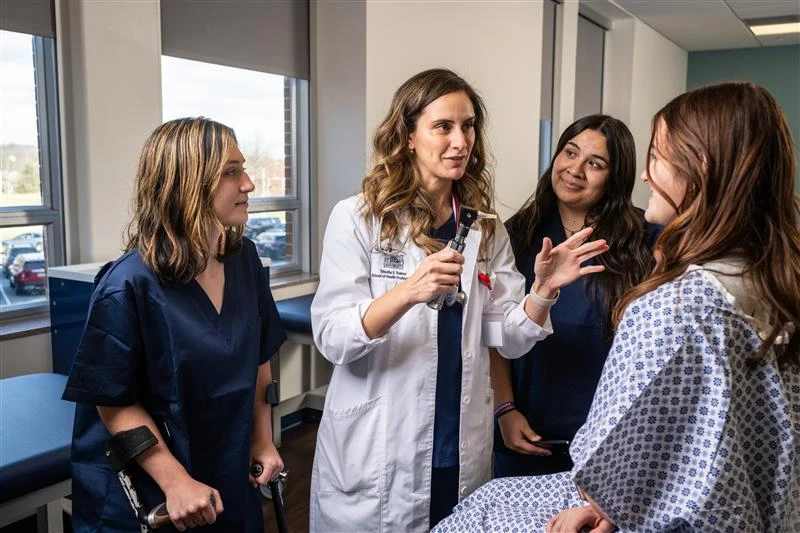
How does your mission as a Catholic university drive the physician assistant program?
Our Catholic identity shapes every aspect of the physician assistant program. The Mount’s commitment to service, compassion, equity, and well-being calls us to prepare clinicians who go beyond transactional medicine.
We aim to form PAs who care deeply for all patients, especially those who are underserved, while also tending to their own well-being so they can flourish long term in their calling to health care.
How did Mount St. Mary’s work with the Daughters of Charity to build this program?
The Daughters of Charity have been extraordinary partners in bringing this vision to life. Their legacy of caring for the poor and vulnerable has inspired the program’s mission and helped us ground our work in the values of humility and loving service.
The Daughters have generously provided both tangible and in-kind support, enabling our inspiring facility, helping fund our Care for America scholarships, and working with us as thought leaders in this work.
SEEK 2026: Bishop Olson of Fort Worth speaks about what he’s praying for, other issues
Posted on 01/3/2026 01:00 AM (CNA Daily News - US)
 Bishop Michael Olson of Fort Worth, Texas, speaks to CNA during the SEEK 2026 conference on Jan. 2, 2026. | Credit: Amira Abuzeid/CNA
Bishop Michael Olson of Fort Worth, Texas, speaks to CNA during the SEEK 2026 conference on Jan. 2, 2026. | Credit: Amira Abuzeid/CNA
Jan 2, 2026 / 20:00 pm (CNA).
Bishop Michael Olson, whose diocese of Fort Worth, Texas, is hosting the SEEK 2026 conference, said he is praying for unity in Christ.
Olson said he has observed that young people attending the conference have “a real openness to God’s call. They very much want to make a difference for Christ” with their lives.
“There’s a sense of communion that the Church has that postmodern reality undercuts. Young people, however, want to be disciples of the Lord. They want to belong, but they want to belong in the way he calls them to belong.”
Regarding what is moving him spiritually right now, he said in an interview that “the heart of my prayer is the prayer of Jesus: That all may be one, as he and the father are one.”
He said he is praying that “we all find communion and unity in Christ, as his Church, which is his intention.”
“With all differences that we’re tempted to be divided over, especially in the sacraments and the liturgy,” he said he prays to help foster a sense of communion among people within the Church.
Immigration
About immigration, a prominent issue in Texas, Olson said that along with the majority of the U.S. bishops, he affirms the rule of law and the integrity of borders, “because without that, there is no sense of peace; there’s chaos and lawlessness and the most vulnerable suffer.”
He said we all have to stop “defining ourselves by partisan ideologies, which feels like the dominant ‘religion’ in the U.S., for Catholics and non-Catholics alike.”
“We have a responsibility to lend comfort [to immigrants] and to provide security. As an international issue and as a nation, we must help other nations to ensure their borders,” he continued.
“Some of the challenges for the leadership of other nations are gangs. The most vulnerable are paying the price, terrified by the tyranny of the gangs,” he said.
“We have to look at ourselves and say, how have we promoted [those challenges] in areas of foreign policy? We’re reaping what we’ve sown,” Olson said.
“What we faced before with abortion and the death penalty, we now face with immigration: The dignity of the human person must be focused on, as well as the primacy of family life as the basis of society,” he said.
Parish and school security
Asked about how security at parishes and Catholic schools is handled in his diocese following recent violence at Catholic schools, he said for the past seven years, the diocese has employed the Guardian ministry, which involves fully vetted, trained, and armed parishioners in partnership with the police.
Those in the ministry are “proactive in cultivating a spirit and practice of deescalation, in the spirit of discipleship with Christ, in order to protect the vulnerable and weak.”
Olson said at the rest of the SEEK conference he plans to spend time with the young people, giving a talk to the seminarians on prayer and St. Thérèse of Lisieux.
Food assistance, housing top Catholic Charities’ policy wish list in 2026
Posted on 01/2/2026 12:00 PM (CNA Daily News - US)
 Credit: Jonathan Weiss/Shutterstock
Credit: Jonathan Weiss/Shutterstock
Jan 2, 2026 / 07:00 am (CNA).
Many people who receive assistance through anti-poverty programs faced disruptions in 2025, and Catholic Charities’ wish list for 2026 includes government support for food assistance and housing.
The largest disruption came in October when food stamps received through the Supplemental Nutrition Assistance Program (SNAP) were delayed amid the government shutdown. Funding for rental and heating assistance were also disrupted.
Confusion about how to implement a memo in January from the Office of Management and Budget calling for a grant freeze also caused delays in funding related to health care, housing affordability, and food assistance.
Luz Tavarez, vice president of government relations at Catholic Charities USA, said “people get nervous and scared” amid disruptions.
Many Catholic Charities affiliates saw an influx in clients, especially during the shutdown, but Tavarez said there are “very poor people who rely on SNAP subsidies for their meals” and who “can’t get to a Catholic Charities [affiliate] or other food pantry for assistance” when it happens.
Long-term eligibility and funding changes to SNAP were also approved in the tax overhaul signed into law in July. Previous rules only included a work requirement up to age 54, but the law extended those requirements up to age 64. It added stricter and more frequent checks for verifying the work requirements.
It also shifted some funding responsibilities away from the federal government and to the states.
Tavarez expressed concern about some of the SNAP changes as well, saying the government should end “burdensome requirements for individuals and states.”
Under the new law, there are stricter rules for verifying a person’s immigration status for benefits. It also limited which noncitizens could receive SNAP benefits, which excluded some refugees and people granted asylum.
Tavarez expressed concern about such SNAP changes, encouraging the government to permit “humanitarian-based noncitizens” to receive those benefits.
Overall the 2025 tax law gave the biggest boost to the richest families while poorer families might get a little less help than before, according to the Congressional Budget Office.
The bill added a work requirement for Medicaid recipients, and this will not take effect until 2027. Under the previous law, there was no work requirement for this benefit. It also shifts some Medicaid funding requirements onto the states.
Tavarez said Catholic Charities has “concerns with how [work requirements are] implemented” moving forward but does not oppose the idea outright: “There’s dignity in work so the Church isn’t necessarily opposed to people working as long as there’s some opportunities for people to do other things and other issues are taken into consideration.”
She also expressed concerns about funding shifts: “We know that not every state views things like SNAP and Medicaid as a good thing. We don’t know how states are going to balance their budget and prioritize these programs.”
2026 wish list
Looking forward to 2026, Tavarez said Catholic Charities hopes the government will restore full funding to the Temporary Emergency Food Assistance Program for food banks and bulk food distribution programs and ensure that funding is protected for school meals and the Special Supplemental Nutrition Program for Women, Infants, and Children.
The Department of Housing and Urban Development (HUD) made policy changes in November that would focus its homelessness funding on “transitional” housing instead of “permanent” housing. This move is facing legal challenges.
President Donald Trump’s administration initially sought to cut federal housing assistance and shift much of those costs to states, but this was ultimately not included in the final version of the 2025 tax law.
In December, Trump promised an “aggressive” housing reform plan that focuses on reducing costs. At this time, the specifics of that proposal have not been announced. The increased cost to buy a new home has outpaced the growth in wages for decades.
Tavarez said Catholic Charities is focused on housing affordability in 2026 and that the solution must be multifaceted. This includes “building and developing affordable housing,” “a tax credit for developers,” “more affordable housing units,” and subsidies and Section 8 vouchers for low-income Americans, she said.
“We recognize that there’s a real crisis — I think everybody does in a bipartisan way — but there needs to be a real bipartisan approach and it’s going to require money,” Tavarez said.
Tax credits and economic trends
Some changes to the tax code included in the 2025 tax law are geared toward helping low-income Americans.
Specifically, the law reduced taxes taken from tips and overtime work. It also increased the child tax credit from $2,000 to $2,200 and tied the credit to inflation, meaning that it will increase each year based on the rate of inflation.
Tavarez characterized the changes to the child tax credit as a “win” and hopes it can be expanded further.
The economy has been a mixed bag, with November unemployment numbers showing a 4.6% rate. In November of last year, it was slightly lower at 4.2%.
Inflation has gone down a little, with the annual rate being around 2.7%. In 2024, it was around 2.9%. The average wage for workers also outpaced inflation, with hourly wages increasing by 3.5%, which shows a modest inflation-adjusted increase of 0.8%.
5-year-old son of Catholic speaker Paul Kim passes away
Posted on 01/1/2026 21:24 PM (CNA Daily News - US)
 Micah Kim, the 5-year-old son of Catholic speaker and influencer Paul Kim, passed away Dec. 31, 2025. | Credit: Screenshot of Paul Kim’s Facebook page, last visited Jan. 1, 2026
Micah Kim, the 5-year-old son of Catholic speaker and influencer Paul Kim, passed away Dec. 31, 2025. | Credit: Screenshot of Paul Kim’s Facebook page, last visited Jan. 1, 2026
Jan 1, 2026 / 16:24 pm (CNA).
Micah Kim, the 5-year-old son of popular Catholic speaker Paul Kim, has passed away, Kim announced in a tearful social media post Thursday afternoon.
Micah died on Wednesday, Dec. 31, 2025, after more than a week on life support following a rare medical emergency brought on by a severe case of the flu.
“Micah Joseph is beginning the new year basking in the never-ending glory, love, and peace of God,” Kim wrote in the post, which was accompanied by a two-part video. “Micah has been very busy already, as I see the Lord using him and sending him on missions to bring millions of people closer to God.”
Kim asked for privacy for his family as they grieve but said he felt he had to provide an update to the millions of people praying for Micah and his family throughout the ordeal. He shared that over the last week and a half, his social media account has been viewed more than 50 million times by people from all over the world offering prayers for the situation.
Micah was rushed to the hospital a week and a half ago after experiencing severe internal bleeding and other complications. Kim, a devoted husband and father of six known for his engaging talks on faith and family at Catholic conferences, first alerted followers via social media on Dec. 22: “My son Micah is having a medical emergency right now and headed to the hospital in an ambulance.”
By Dec. 24, Micah underwent emergency chest surgery to address the bleeding, which successfully stabilized his heart function. Kim shared on social media that after the surgery, his son’s heart began beating independently and his vital signs remained steady.
Doctors gradually reduced life support, with Micah’s lungs showing slow improvement on a ventilator. However, a subsequent MRI revealed severe brain damage, leading physicians to conclude there is “no medical possibility” of recovery.
“I couldn’t be a prouder father,” Kim said in his Jan. 1 post. “This reality gives me great joy and hope in the midst of sorrow. Our hearts are broken; but we trust in the Lord. Please pray for my family and me as we learn how to live by faith and not by sight.”
Cardinals, bishops, priests, deacons, and laypeople — including many well-known Catholic media personalities — had messaged Kim and told him they were praying for his son, he said. Kim had prayed the Divine Mercy Chaplet live with followers during the ordeal, and the family had asked for a miracle through the intercession of Venerable Fulton Sheen.
In addition to an outpouring of prayer for Micah, a GoFundMe campaign was begun to support the family amid mounting medical costs.
“Thank you for all the love, prayers, and compassion that a countless number of you have showed us,” Kim wrote. “May God truly bless you. Your prayers for Micah were answered, but in a different way than what we had all hoped for. God healed and welcomed him into eternal life. He is where we all want to be.”
Amira Abuzeid contributed to this story.
CNA’s top Catholic moments of 2025
Posted on 12/31/2025 13:00 PM (CNA Daily News - US)
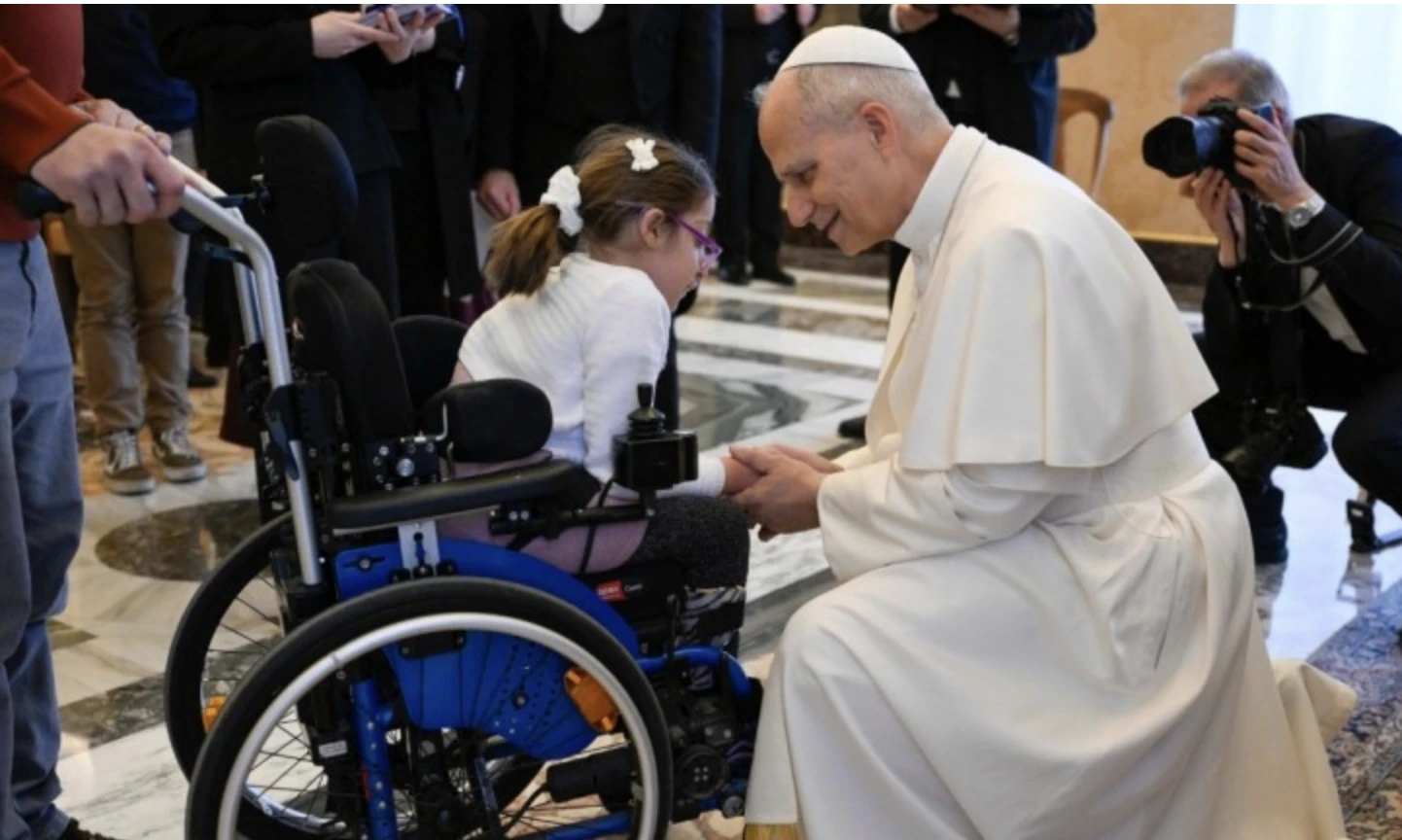 Pope Leo XIV greets a girl in a wheelchair during an audience with members of Italian Catholic Action on Dec. 19, 2025 at the Vatican. Credit: Vatican Media
Pope Leo XIV greets a girl in a wheelchair during an audience with members of Italian Catholic Action on Dec. 19, 2025 at the Vatican. Credit: Vatican Media
Dec 31, 2025 / 08:00 am (CNA).
2025 was filled with impactful moments — from the death of Pope Francis to the election of the first American-born pope, Leo XIV, to hundreds of thousands of young people who gathered in Rome for the Jubilee of Youth to the canonization of the Church’s first millennial saint.
Here are some of the top Catholic moments of 2025:
Death of Pope Francis
The new year began with Catholics around the world uniting in prayer for Pope Francis’ health as he entered the hospital on Feb. 14. He was admitted to Gemelli Hospital in Rome due to a respiratory infection that progressed to bilateral pneumonia, requiring a prolonged hospitalization that lasted almost six weeks.
On March 23, Pope Francis was discharged from the hospital and gave a blessing from the hospital window to the faithful who were gathered.
Soon after, on March 29, the late pontiff was readmitted to the hospital with difficulty breathing. On April 21, the day after Easter, Pope Francis passed away at the age of 88 from a stroke, coma, and irreversible cardiovascular collapse, according to the death certificate published just over 12 hours after Francis’ death.
More than 400,000 people filled St. Peter’s Square for the funeral of Pope Francis on April 26 as the world said goodbye to the first Latin American pope, who led the Catholic Church for 12 years.
Conclave and election of Pope Leo XIV
On May 7, 133 cardinal electors gathered in the Sistine Chapel for the start of the conclave. After four ballots, Cardinal Robert Prevost was elected on May 8 as the 267th pope of the Catholic Church and took the name Pope Leo XIV. A Chicago native, he became the first American pope in Church history.
Thousands gathered in St. Peter’s Square erupted in cheers as the bells of the basilica began to toll, confirming the election of a new pontiff. The crowds gathered as word spread throughout Rome that a new pope had been chosen.
Jubilee of Youth
One of Pope Leo’s first major events was the Jubilee of Youth, which was held in Rome from July 28 to Aug. 3. Roughly 1 million young adults from around the world filled the streets of Rome as each day was filled with different opportunities and events for the young people to experience the richness of the Catholic faith.
On Aug. 2, Pope Leo XIV was greeted by the largest crowd he had addressed during his pontificate thus far for the evening vigil at Tor Vergata, an outdoor venue 10 miles east of Rome. An estimated 1 million people were in attendance. The Holy Father arrived by helicopter and then drove through the grounds on the popemobile, waving to the cheering young people before the prayer service began.
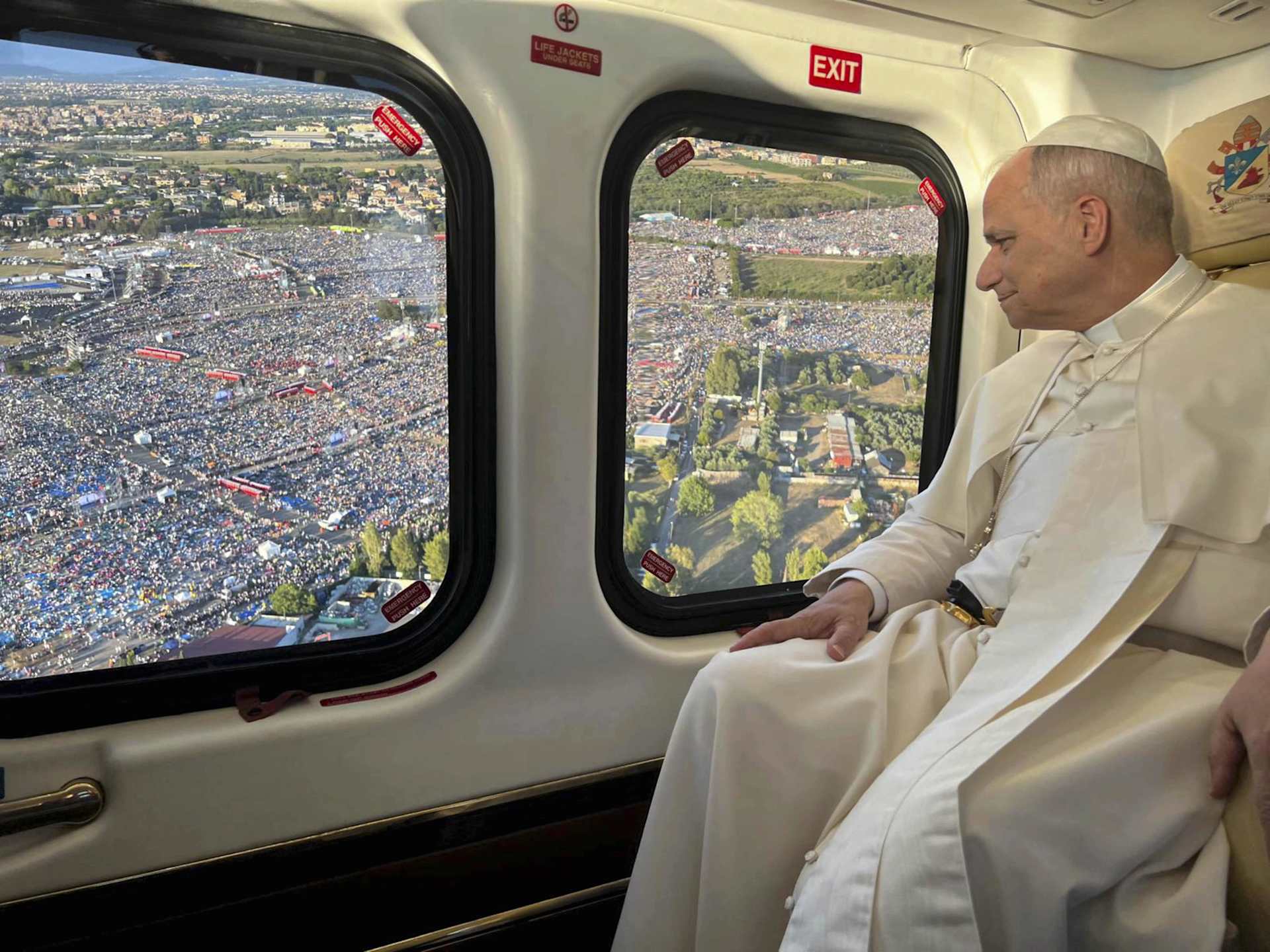
Minneapolis school shooting
The Catholic community was shaken when a school shooting took place on Aug. 27 at Annunciation Catholic Church in Minneapolis. Two children were killed and 20 were injured. The shooter was identified as Robin Westman — who was born “Robert” and identified as a transgender woman — who died by suicide shortly after shooting through the windows of the church during a weekday school Mass.
The Holy Father sent his condolences and offered prayers for the victims. He described the event as an “extremely difficult” and “terrible” tragedy.
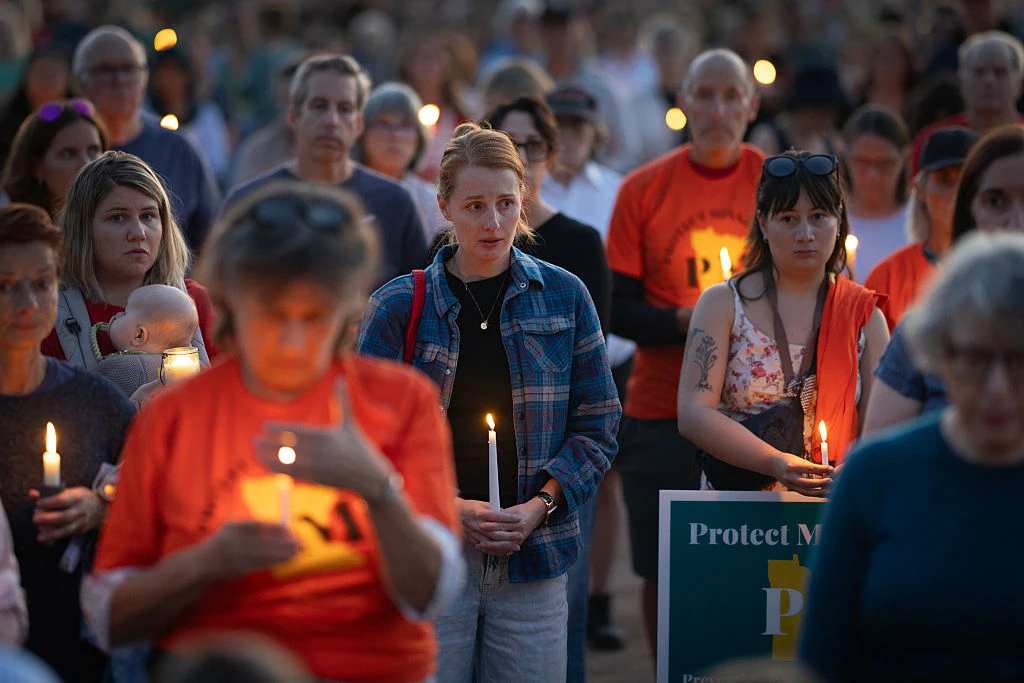
Canonization of Carlo Acutis and Pier Giorgio Frassati
On Sept. 7, two of the Church’s most beloved blesseds became saints: Carlo Acutis and Pier Giorgio Frassati. The canonizations of the two men, promulgated before an estimated 70,000 people in St. Peter’s Square, were the first of Leo XIV’s pontificate.
During his homily, the pope said: “Today we look to St. Pier Giorgio Frassati and St. Carlo Acutis: a young man from the early 20th century and a teenager from our own day, both in love with Jesus and ready to give everything for him.”
“Dear friends, Sts. Pier Giorgio Frassati and Carlo Acutis are an invitation to all of us, especially young people, not to squander our lives but to direct them upwards and make them masterpieces,” he added.
Newman made doctor of the Church
The Catholic Church gained a new doctor of the Church on Nov. 1 , when Pope Leo XIV declared St. John Henry Newman a doctor of the Church, recognizing the English cardinal and theologian — one of the most influential converts from Anglicanism — as a towering figure of faith and intellect in modern Catholicism.
“Newman’s impressive spiritual and cultural stature will surely serve as an inspiration to new generations whose hearts thirst for the infinite and who, through research and knowledge, are willing to undertake that journey which, as the ancients said, takes us ‘per aspera ad astra,’ through difficulties to the stars,” the pope said in his homily.
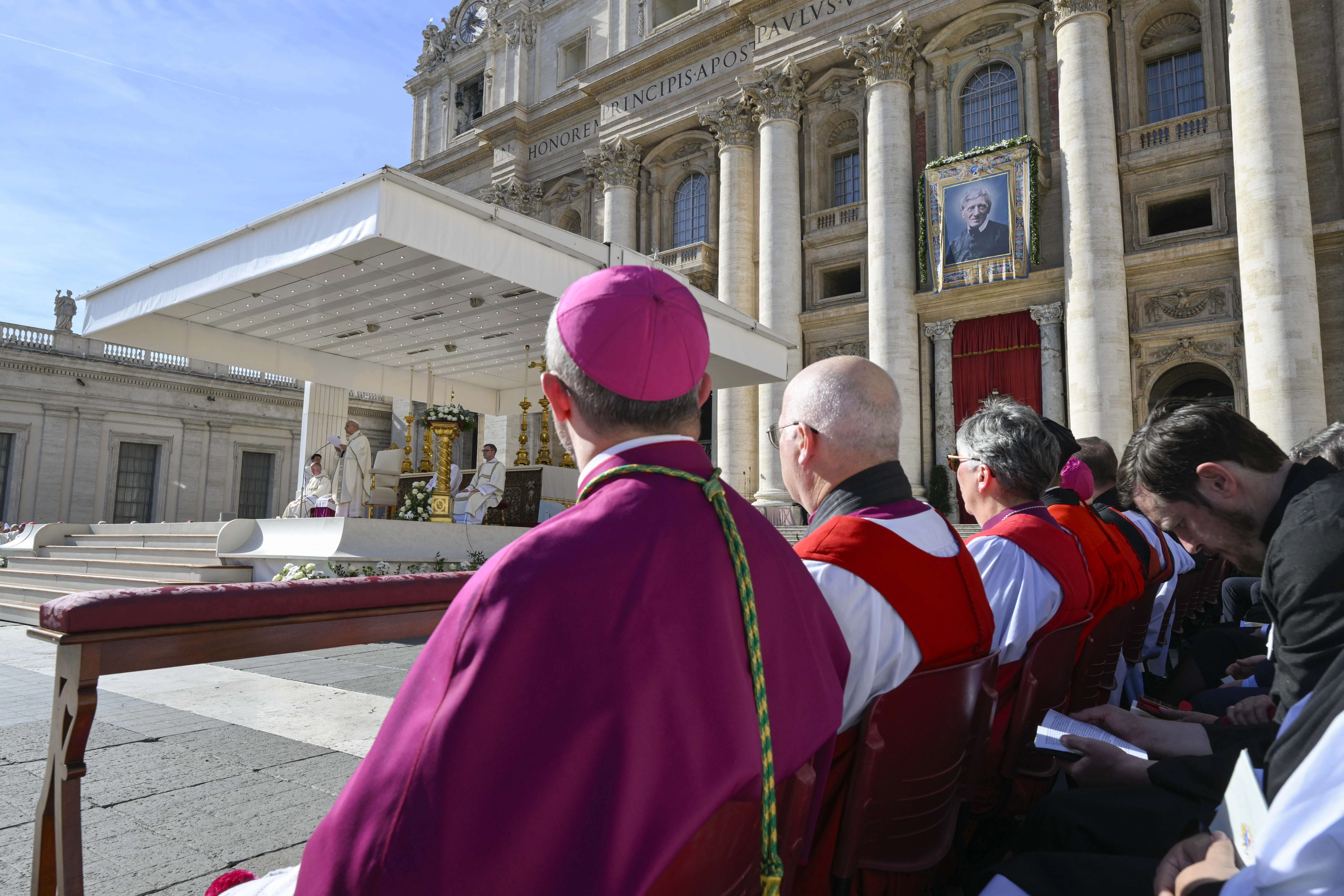
Pope Leo featured at NCYC
On Nov. 21, Pope Leo took part in his first digital encounter with American youth during the National Catholic Youth Conference, which took place Nov. 20–22 in Indianapolis.
The conference featured Catholic speakers, daily Mass and adoration, music and worship, breakout groups and workshops, and interactive exhibits with games, vendors, meetups, and live radio shows.
The main attraction of the conference was the hourlong live, virtual dialogue the pope had with those in attendance. Five young people were chosen to ask the Holy Father questions, which ranged from prayer to technology to friendships and the future of the Church. Pope Leo gave those gathered invaluable advice regarding the several different topics discussed.
First papal trip to Turkey and Lebanon
Pope Leo visited Turkey and Lebanon during his first papal trip from Nov. 27–Dec. 2. The wide-ranging international visit included historic ecumenical encounters, deeply symbolic gestures of prayer, and pastoral visits to Christian communities under pressure. The Holy Father highlighted the importance of unity, peace, and fraternity, and brought encouragement to a region marked by ancient faith and present suffering.
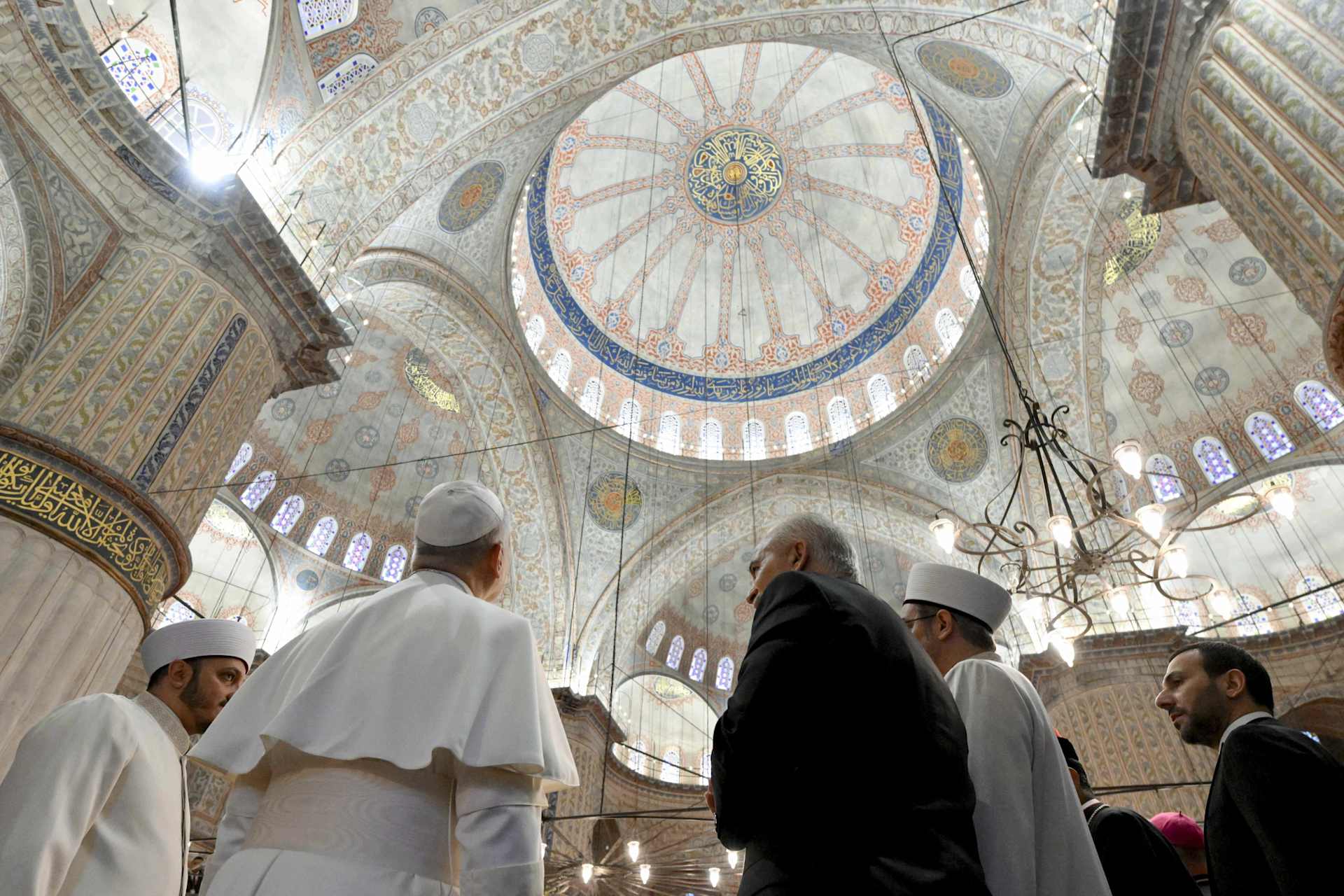
Rest in peace: Looking back at notable Catholics who passed away in 2025
Posted on 12/31/2025 11:00 AM (CNA Daily News - US)
 Credit: udra11/Shutterstock
Credit: udra11/Shutterstock
Dec 31, 2025 / 06:00 am (CNA).
The past year has seen several notable Catholics pass away — from public officials to the vicar of Christ himself.
Here’s a rundown of some prominent Catholics around the world who left us in 2025:
Pope Francis (Dec. 17, 1936 — April 21, 2025)
The Holy Father, Pope Francis, passed away at 7:35 a.m. on Easter Monday, April 21, at his residence in the Vatican’s Casa Santa Marta. The 88-year-old pontiff led the Catholic Church for a little more than 12 years.
The first Latin American pope in history as well as the first Jesuit pope, Francis led the Church through significant canonical and catechetical reforms, urging the faithful to reach out and minister to those on the margins of society while preaching the mercy of God.
Upon his death he left the legacy of what Cardinal Kevin Farrell said was a life “dedicated to the service of God and his Church,” one that urged the faithful to “live the values of the Gospel with fidelity, courage, and universal love, especially for the poorest and most marginalized.”
Pope Francis was succeeded in the chair of St. Peter by Pope Leo XIV on May 8.
Mabel Landry Staton (Nov. 20, 1932 — Feb. 20, 2025)
Mabel Landry Staton, a trailblazing athlete who briefly set an Olympic record at the 1952 Summer Olympics, died on Feb. 20 at age 92.
Representing the United States at the Olympic games in Helsinki in 1952, Staton — known as “Dolly” after a nickname from her father — set a record in the long jump category at 19 feet 3.25 inches. Though the record only lasted for several minutes before New Zealand athlete Yvette Williams bested it, Staton would go on to win medals in the 1955 Pan American Games.
The Philadelphia Inquirer reported that Staton served as a Eucharistic minister at St. Thomas More Church in Cherry Hill, New Jersey, as well as on the board of the Black Catholic Ministry of the Diocese of Camden.
According to the Inquirer, Staton “could still outsprint some of the local high school boys in her 70s.”
Alasdair MacIntyre (Jan. 12, 1929 — May 21, 2025)
Alasdair MacIntyre, a towering figure in moral philosophy and a Catholic convert credited with reviving the discipline of virtue ethics, died on May 21 at age 96.
His seminal 1981 work “After Virtue” reshaped contemporary moral and political philosophy, emphasizing virtue over utilitarian or deontological frameworks.
Known by many as “the most important” modern Catholic philosopher, MacIntyre’s intellectual and spiritual journey spanned atheism, Marxism, Anglicanism, and ultimately Roman Catholicism.
James Hitchcock (Feb. 13, 1938 — July 14, 2025)
James Hitchcock — a noted historian of the Catholic Church, popular author, and longtime college professor — died on July 14 at age 87.
Hitchcock was remembered by friends and colleagues as a man of prophetic insight who defended Church teaching and helped to make the Catholic intellectual tradition accessible for his students and readers.
Hitchcock taught history at Saint Louis University from the late 1960s until 2013. Some of the most popular of the dozen books he wrote include his one-volume “History of the Catholic Church: From the Apostolic Age to the Third Millennium,” published in 2012 by Ignatius Press.
Frank Caprio (Nov. 24, 1936 — Aug. 20, 2025)
Frank Caprio, who served as a Providence, Rhode Island, municipal court judge for nearly 40 years and came to be known as “America’s nicest judge,” passed away on Aug. 20 from pancreatic cancer.
Caprio gained worldwide fame for a lenient judicial style that blended justice, extreme empathy, and mercy when his courtroom was televised in a program called “Caught in Providence.”
The program began in 1999 and went viral in 2017, achieving hundreds of millions of views since then. The show was nominated for a Daytime Emmy Award in 2021 and has a YouTube channel with nearly 3 million subscribers.
Caprio told EWTN News in February that he always kept in mind something his father, a hardworking Italian immigrant with a fifth-grade education, had impressed upon him: “What might seem like a small fine to some was something that many couldn’t afford.”
“Your case is dismissed” became Caprio’s signature phrase.
Thomas A. Nelson (March 1, 1937 — Aug. 16, 2025)
Thomas A. Nelson, the founder of TAN Books — a Catholic publishing house known for its books promoting traditional Catholicism in the post-Vatican II era — died Aug. 16 at age 88.
Nelson, who had previously worked as a teacher, founded TAN Books and Publishers Inc. in Rockford, Illinois, in 1967 and an accompanying printing plant in 1978. In addition to being Nelson’s initials, TAN is an acronym for the Latin phrase “Tuum Adoramus Nomen” (“Let Us Adore Thy Name”).
Under Nelson’s ownership, TAN became known for publishing orthodox Catholic books, including reprints of classic Catholic works on theology, Scripture, traditional devotions, the Traditional Latin Mass, and the lives of the saints as well as new titles on these subjects by contemporary authors.
Katharine, Duchess of Kent (Feb. 22, 1933 — Sept. 4, 2025)
The Duchess of Kent, who became the first senior British royal to be received into the Catholic Church since the 17th century, died on Sept. 4 at the age of 92.
Renowned for her natural charm, compassion for the sick and downtrodden, and commitment to serving others, the duchess was a much-loved and hardworking British royal whose popularity was enhanced by her own personal suffering and self-effacing nature.
She was received into the Church in January 1994 by Cardinal Basil Hume. Up until then, no senior royal had publicly been received into the Church since 1685.
Katharine spoke favorably of the Church’s moral precepts. “I do love guidelines and the Catholic Church offers you guidelines,” she once told the BBC. “I have always wanted that in my life. I like to know what’s expected of me.”
Sister Jean Dolores Schmidt (Aug. 21, 1919 — Oct. 9, 2025)
Sister Jean Dolores Schmidt, the beloved Catholic nun who became known across the country at the age of 98 as the chaplain of the Loyola University Chicago men’s basketball team, died Oct. 9 at the age of 106.
Sister Jean was born Dolores Bertha Schmidt on Aug. 21, 1919, to Joseph and Bertha Schmidt. She was raised in a devout Catholic home in San Francisco’s Castro District.
In 1937, she joined the Sisters of Charity of the Blessed Virgin Mary and took the name Sister Jean Dolores. In 1991, she joined the staff at Loyola Chicago and three years later became part of the basketball team, first as an academic adviser before transitioning to chaplain.
Sister Jean led the team in prayer before each game — praying for her players to be safe, for the referees to be fair, and for God’s assistance during the game.
She also admitted to praying for the opposing team, though “not as hard.”
Sister Mary Michael of the Eucharistic Heart of Jesus, PCPA (Feb. 25, 1931 — Nov. 10, 2025)
Sister Mary Michael of the Eucharistic Heart of Jesus, PCPA, died on Nov. 10 at age 94 after roughly three-quarters of a century of religious life.
Sister Mary Michael was the last of the original five nuns who, along with EWTN foundress Mother Angelica, began the Our Lady of the Angels Monastery in Irondale, Alabama.
Born Evelyn Shinosky on Feb. 25, 1931, to Joseph and Helen Shinosky, she entered Sancta Clara Monastery in Canton, Ohio, on Aug. 15, 1951, and received the habit and her new name the following May.
Her passing marked the end of an era at EWTN and at the monastery — one that saw both the launch of the global Catholic network and the expansion of the religious community to include the Shrine of the Most Blessed Sacrament of Our Lady of the Angels Monastery.
Paul Badde (March 10, 1948 — Nov. 10, 2025)
Paul Badde, author of many well-known books such as “Benedict Up Close,” “The Face of God,” and “The True Icon,” died on Nov. 10 at the age of 77 after a long illness. Badde was also a veteran contributor to EWTN and CNA Deutsch, CNA’s German-language news partner.
Born in Schaag, Germany — a small village on the Lower Rhine — he studied philosophy and sociology in Freiburg as well as art history, history, and political science in Frankfurt. Before embarking on a journalistic career, Badde worked as a teacher for several years.
A founding editor of Vatican Magazine, Paul and his wife, Ellen, had five children.
Sister JoAnn Persch (June 27, 1934 — Nov. 14, 2025)
Longtime immigrant rights advocate Sister JoAnn Persch died on Nov. 14 at age 91.
Two weeks before her death, Persch attempted to bring Communion to detainees at the Broadview, Illinois, Immigration and Customs Enforcement (ICE) facility where for decades the Sisters of Mercy ministered to migrants and refugees. Officials denied her entry.
Persch and Sister Pat Murphy were founding members of the Su Casa Catholic Worker House in Chicago, serving refugees from Central America who were survivors of war, torture, and political persecution.
May the souls of the faithful departed, through the mercy of God, rest in peace.
Rep. Tom Emmer credits his parents’ example in fostering Catholic faith
Posted on 12/30/2025 13:00 PM (CNA Daily News - US)
 U.S. House Majority Whip Rep. Tom Emmer, R-Minnesota, talks about his faith with Eric Rosales on “EWTN News Nightly” on Dec. 29, 2025. | Credit: “EWTN News Nightly”/Screenshot
U.S. House Majority Whip Rep. Tom Emmer, R-Minnesota, talks about his faith with Eric Rosales on “EWTN News Nightly” on Dec. 29, 2025. | Credit: “EWTN News Nightly”/Screenshot
Dec 30, 2025 / 08:00 am (CNA).
Republican Rep. Tom Emmer, U.S. House majority whip, said his Catholic faith was formed by his parents’ example at a young age and he encouraged Americans to reflect more on God in a culture filled with many distractions.
Emmer, of Minnesota, spoke to “EWTN News Nightly” about the faith of his parents, including his father’s daily Mass attendance and his mother’s decision to gift her husband a rosary on their wedding day.
“The example that they set, is, I believe, why I am who I am,” Emmer said.
“I’m the son of Tom and Patsy Emmer who literally met in the sixth and seventh grade at Our Lady of Grace Catholic grade school in Edina, Minnesota,” he said. “[They] were married for 60-some years; they literally lived around the corner from each other, and they never moved more than about two or three miles from where they originally grew up.”
Emmer attended a Catholic elementary school and high school. He said he sang in the church choir, saying he “was a soprano” as a child but can no longer reach the high notes.
“When I try to do ‘and the rockets’ red glare,’ I can only say it. My voice doesn’t go there anymore,” Emmer said.
The congressman also opened up about his sister Bridget’s death from breast cancer, saying it made him question God’s will. Yet, he said a conversation with her before her death helped bolster his faith and to stop being angry with God.
Emmer said some older women told his sister that she was too young to have cancer and that he initially told her: “I kind of agree with them.” He said she responded by saying: “Would I love to live forever? Absolutely. But I’m not going to, and people who talk like that have not gotten every second out of every minute out of every hour of every day. I have lived a good life; if God comes and calls me today, so be it.”
Emmer emphasized the importance of reflecting on God’s goodness in a world that has become filled with distractions.
“Too many people, in this age of social media and all the other stuff — the world gets going so fast that they don’t take a minute to sit down and check out what the good Lord has created,” Emmer said.
Legislative activity
According to a 2025 report from the Pew Research Center, about 28% of Congress is Catholic. More than half of Catholic lawmakers in both the House and the Senate are Democrats.
Emmer, the third-ranking House Republican, has consistently opposed abortion access during his 11 years in Congress, receiving an A+ rating from Susan B. Anthony Pro-Life America. He also has been critical of what he calls “radical gender ideology.”
His stances have not aligned with Church teaching regarding his support for in vitro fertilization (IVF). When he ran for governor of Minnesota in 2010, Emmer opposed same-sex civil marriage. He later shifted his position and voted in favor of a law enacted in 2022 to require states to recognize same-sex civil marriages performed out of state. The Catholic Church does not recognize same-sex civil unions as marriage according to its doctrine and sacramental theology.
Emmer has generally supported President Donald Trump’s deportation efforts. The U.S. Conference of Catholic Bishops (USCCB) approved a “special message” in November opposing “the indiscriminate mass deportation of people.”
How federal and state abortion policies shifted in 2025
Posted on 12/30/2025 12:00 PM (CNA Daily News - US)
 Fifty-one senators asked the FDA to rescind its approval of a generic version of the abortion drug mifepristone on Oct. 9, 2025. | Credit: Yta23/Shutterstock
Fifty-one senators asked the FDA to rescind its approval of a generic version of the abortion drug mifepristone on Oct. 9, 2025. | Credit: Yta23/Shutterstock
Dec 30, 2025 / 07:00 am (CNA).
Abortion policy at the federal and state levels has continued to shift in the United States three and a half years since the Supreme Court overturned Roe v. Wade in its June 2022 Dobbs v. Jackson Women’s Health Organization decision.
At the federal level, President Donald Trump’s administration and congressional Republicans made strides to pull back funding for organizations that advocate for abortion access and to reinstate conscience protections. Yet the administration also approved a generic abortion pill and failed to further regulate chemical abortion drugs.
Some states adopted new restrictions on abortion, but others expanded policies to increase abortion access. In most states, changes to abortion policy were minimal, as many states already set their post-Dobbs abortion policies in the previous years.
Federal: Trump administration shifts
Abortion policy at the federal level shifted shortly after Trump took office, with the administration reinstating many policies from Trump’s first term that had been abandoned for four years under President Joe Biden’s administration.
Trump reinstated the Mexico City Policy during his first week in office, which requires foreign organizations to certify they will not perform, promote, or actively advocate for abortion to receive U.S. government funding. In June, the Centers for Medicare and Medicaid Services rescinded Biden-era guidelines that had required emergency rooms to perform abortions when a pregnant woman had a life-threatening emergency (like severe bleeding, ectopic pregnancy, or risk of organ failure) to stabilize her condition — even in states where abortion is otherwise banned.
Other changes within federal departments and agencies included rescinding a Department of Defense policy that provided paid leave and travel expenses for abortion and a proposed rule change to end abortion at Veterans Affairs facilities.
The Department of Health and Human Services has also withheld Title X family planning funds from Planned Parenthood. Trump also signed a government spending bill that withheld Medicaid reimbursements from Planned Parenthood. Federal tax money was not spent directly on abortion before those changes, but abortion providers did receive funds for other purposes.
Nearly 70 Planned Parenthood abortion clinics shut down in 2025 amid funding cuts.
Those closures came as the administration advanced changes affecting abortion medication. Although the administration announced it would review the abortion pill, the Food and Drug Administration approved a new generic version of the drug mifepristone. Bloomberg Law reported the review has been delayed, although officials deny it.
The state-level results in 2025 have also been mixed, with a few states adding pro-life laws and others expanding access to abortion.
In Texas, where nearly all abortions are illegal, lawmakers passed a bill that allows families to sue companies that manufacture or distribute chemical abortion pills. This comes as state laws related to chemical abortions often conflict, with states like New York enforcing “shield laws” that order courts to not cooperate with out-of-state lawsuits or criminal charges against abortionists within their states.
Lawmakers in Wyoming passed a law overriding a veto from the governor that requires women to receive an ultrasound before they can obtain an abortion. However, the law was blocked by a court and is not in effect.
There were two pro-life legal wins for states in 2025 as well.
In November, the North Dakota Supreme Court ruled in favor of the state’s near-total abortion ban after it was temporarily blocked by a lower court. Under the law, unborn life is protected at every stage in pregnancy in most cases, but it remains legal in the first six weeks in cases of rape and incest and for the duration of pregnancy when the mother is at risk of death or serious physical harm.
The U.S. Supreme Court ruled in June that a South Carolina policy to withhold Medicaid funding for Planned Parenthood could stay in place. This ruling also opened the door for other states to adopt similar policies moving forward.
In at least 10 states, lawmakers enacted bills to provide more funding for pro-life pregnancy centers, which offer life-affirming alternatives to abortion for pregnant women.
Alternatively, a handful of states in 2025 expanded their shield laws, which prevent courts from complying with out-of-state criminal or civil cases against abortionists. This includes new laws in California, Vermont, Massachusetts, and New York. Several states expanded these laws by allowing pharmacies to provide chemical abortion pills without listing the name of the doctor who prescribed them to prevent out-of-state legal action.
About a dozen states expanded funding for abortion providers, such as California directing $140 million to Planned Parenthood to counteract federal defunding efforts. Maryland established a new program called the Public Health Abortion Grant Program, which offers abortion coverage through Affordable Care Act funds.
New laws in Colorado and Washington require emergency rooms to provide abortions when the procedure is deemed “necessary.” A law adopted in Illinois requires public college campuses to provide the abortion pill at their pharmacies.
Connecticut removed its parental notification policy regarding abortion, which means that minors are allowed to obtain abortions without the consent of their parents.
As of December, 13 states prohibit most abortions, four states ban abortions after six weeks’ gestation, two have bans after 12 weeks, and one has a ban after 18 weeks. The other 30 states and the District of Columbia permit abortion up to the 22nd week or later. Nine of those states allow elective abortion through nine months until the moment of birth.
Popular Catholic speaker pleads for a miracle amid son’s medical emergency
Posted on 12/29/2025 22:51 PM (CNA Daily News - US)
 Micah Kim, 5, son of popular Catholic speaker Paul Kim, is anointed by a priest on Dec. 26, 2025. Credit: Courtesy of Paul Kim's Facebook page / null
Micah Kim, 5, son of popular Catholic speaker Paul Kim, is anointed by a priest on Dec. 26, 2025. Credit: Courtesy of Paul Kim's Facebook page / null
Dec 29, 2025 / 17:51 pm (CNA).
Paul Kim, a highly popular Catholic youth and young adult speaker, continues to share updates on his 5-year-old son, Micah, who remains on life support following a sudden medical emergency just days before Christmas.
Entering his ninth day in the hospital, Micah’s condition has sparked an outpouring of prayers across the globe, with the family invoking the intercession of Venerable Fulton Sheen for a miracle amid grim medical prognoses.
The ordeal began when Micah was rushed to the hospital last week after experiencing severe internal bleeding and other complications. Kim, a devoted husband and father of six known for his engaging talks on faith and family at Catholic conferences, first alerted followers via social media on Dec. 22: “My son Micah is having a medical emergency right now and headed to the hospital in an ambulance.”
By Dec. 24, Micah underwent emergency chest surgery to address the bleeding, which successfully stabilized his heart function. Kim shared on social media that after the surgery, his son’s heart began beating independently and his vital signs remained steady.
Doctors gradually reduced life support, with Micah’s lungs showing slow improvement on a ventilator. However, a subsequent MRI revealed severe brain damage, leading physicians to conclude there is “no medical possibility” of recovery.
“Micah is fighting for his life,” Kim said in a Dec. 29 update on Instagram. “We’re waiting on the Lord, and we don’t give up trust.”
Micah received the sacrament of anointing of the sick on Dec. 23 at 3 p.m., “when divine mercy redeemed us all,” and Kim invited all Catholics to join with his family in praying the Divine Mercy Chaplet, humbly requesting a miracle “through the intercession of Archbishop Fulton Sheen.”
In addition to an outpouring of prayer for Micah, a GoFundMe campaign was begun to support the family amid mounting medical costs.
“Praying that all is stable and the parents are resting,” one supporter posted on social media platform X, echoing widespread sentiment.
As of Dec. 29, Micah’s kidney function remains a concern, but the family is holding fast to hope. “Please keep praying! God has the ultimate say. He is the Divine Physician,” Kim noted on Instagram.